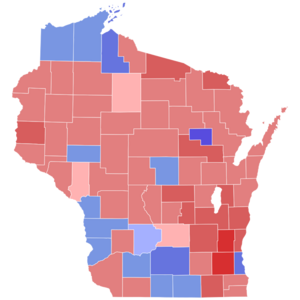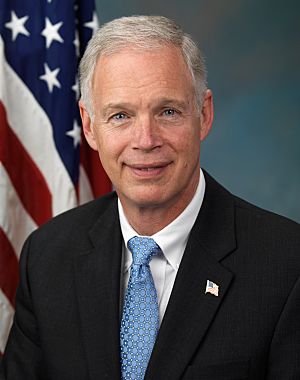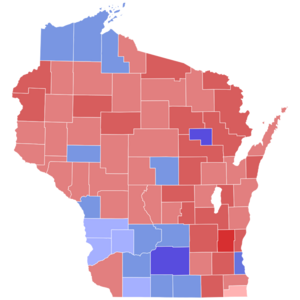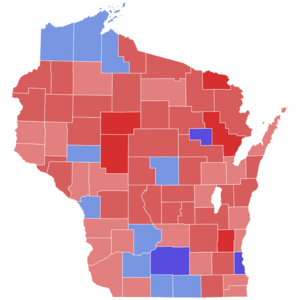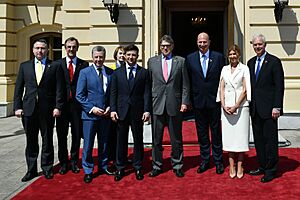Ron Johnson facts for kids
Quick facts for kids
Ron Johnson
|
|
|---|---|
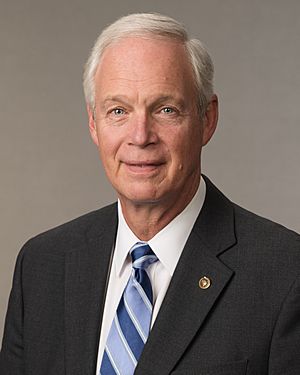
Official portrait, 2020
|
|
| United States Senator from Wisconsin |
|
| Assumed office January 3, 2011 Serving with Tammy Baldwin
|
|
| Preceded by | Russ Feingold |
| Chair of the Senate Homeland Security and Governmental Affairs Committee | |
| In office January 3, 2015 – February 3, 2021 |
|
| Preceded by | Tom Carper |
| Succeeded by | Gary Peters |
| Personal details | |
| Born |
Ronald Harold Johnson
April 8, 1955 Mankato, Minnesota, U.S. |
| Political party | Republican |
| Spouse |
Jane Curler
(m. 1977) |
| Children | 3 |
| Education | University of Minnesota (BS) |
| Website | |
Ronald Harold Johnson (born April 8, 1955) is an American politician and businessman. He is the senior United States senator for the state of Wisconsin. He has served in the Senate since 2011 and is a member of the Republican Party.
Johnson won his first Senate election in 2010, defeating the Democratic senator at the time, Russ Feingold. He won again in 2016 in a rematch against Feingold. In 2022, he was reelected for a third term.
Before becoming a politician, Johnson was the chief executive officer (CEO) of a plastics manufacturing company in Oshkosh, Wisconsin.
As a senator, Johnson has been a strong supporter of former President Donald Trump. He has expressed doubts about the scientific agreement on climate change. During the COVID-19 pandemic, he questioned the safety of vaccines and promoted unproven treatments.
Contents
Early Life and Business Career
Ronald Harold Johnson was born in Mankato, Minnesota. His father's family was from Norway, and his mother's family was from Germany. As a kid, he had many jobs, including delivering newspapers and working at a restaurant. He graduated from the University of Minnesota in 1977 with a degree in business and accounting.
In 1979, Johnson and his wife, Jane, moved to Oshkosh, Wisconsin. He began working at PACUR, a plastics company started by his wife's brother. Johnson worked as an accountant and machine operator. He later became the company's CEO. He led the company until he was elected to the Senate in 2010.
U.S. Senate Career
Johnson first ran for office in 2010. He is associated with the Tea Party movement, a conservative political group. He has been elected to the Senate three times.
2010 Election
In his first campaign, Johnson ran against the Democratic senator Russ Feingold. Johnson won the election with 52% of the vote. He used a lot of his own money to pay for his campaign. After being elected, he promised to put his money and property into a "blind trust," which means someone else manages it so he doesn't have a conflict of interest.
2016 Election
Johnson ran for reelection in 2016. He once again faced Russ Feingold. Many people thought Johnson was likely to lose, but he won the election with just over 50% of the vote.
2022 Election
In 2016, Johnson had promised to serve only two terms. However, in 2022 he decided to run for a third term. His Democratic opponent was Wisconsin's Lieutenant Governor, Mandela Barnes. Johnson won the close race with 50.4% of the vote.
Committee Work
As a senator, Johnson serves on several important committees:
- Committee on Foreign Relations
- Committee on the Budget
- Committee on Homeland Security and Governmental Affairs
- Committee on Commerce, Science, and Transportation
Political Views
Johnson is known for his conservative political views.
Climate Change and the Environment
Johnson does not agree with the scientific consensus on climate change, which states that human activities are the main cause of global warming. In 2010, he called the idea "lunacy." He has also claimed that the climate has not warmed in recent years, even though data shows that world temperatures have been rising.
When asked about drilling for oil in the Great Lakes, he said we have to "get the oil where it is" but do it responsibly. He later said this did not mean he supported drilling in the Great Lakes.
The Economy
Johnson has often called for cutting government spending. He supported the Tax Cuts and Jobs Act of 2017 passed under President Trump. This law lowered taxes for many companies and individuals.
He has also suggested that popular government programs like Social Security and Medicare should be voted on by Congress every year, instead of being funded automatically. He called Social Security a "Ponzi Scheme."
Health Care
Johnson is against the Affordable Care Act (also known as Obamacare) and has voted to end it. In 2022, he said that if Republicans won control of the government, they should try to repeal the law again.
During the COVID-19 pandemic, Johnson questioned the need for widespread vaccination. He used his role as chairman of a Senate committee to hold hearings where witnesses promoted unproven ideas and treatments for COVID-19. He also suggested that mouthwash could be a treatment for the virus, a claim that is not supported by science.
Support for Donald Trump
Johnson has been a loyal supporter of former President Donald Trump.
As chairman of the Senate Homeland Security Committee, Johnson led investigations into Trump's political opponents, including Joe Biden. His investigation into Biden's work in Ukraine did not find any proof of wrongdoing.
2020 Election and Capitol Attack
After the 2020 United States presidential election, Johnson supported Trump's false claims that the election was stolen due to widespread fraud. He at first said he would object to certifying the election results. However, after the attack on the U.S. Capitol on January 6, 2021, he voted to certify the results.
Johnson later downplayed the seriousness of the Capitol attack. He said he was not concerned by the rioters because they "loved their country." He also claimed he might have been concerned if the protesters had been from Black Lives Matter or Antifa. This comment was criticized by members of both political parties.
The House committee investigating the January 6 attack found that an aide to Johnson tried to give Vice President Mike Pence a list of fake electors from Wisconsin and Michigan. These fake electors were part of a plan to overturn the election results. Johnson said he was not aware of what was happening.
Personal Life
Johnson and his wife, Jane, live in Oshkosh, Wisconsin. They have three children.
Electoral History
| Party | Candidate | Votes | % | |
|---|---|---|---|---|
| Republican | Ron Johnson | 500,925 | 84.7% | |
| Republican | Dave Westlake | 61,303 | 10.4% | |
| Republican | Stephen Finn | 29,005 | 4.9% | |
| Party | Candidate | Votes | % | |||
|---|---|---|---|---|---|---|
| Republican | Ron Johnson | 1,125,999 | 51.86% | |||
| Democratic | Russ Feingold (incumbent) | 1,020,958 | 47.02% | |||
| Republican gain from Democratic | ||||||
| Party | Candidate | Votes | % | |
|---|---|---|---|---|
| Republican | Ron Johnson (incumbent) | 248,754 | 99.5% | |
| Party | Candidate | Votes | % | |
|---|---|---|---|---|
| Republican | Ron Johnson (incumbent) | 1,479,262 | 50.2% | |
| Democratic | Russ Feingold | 1,380,496 | 46.8% | |
| Libertarian | Phil Anderson | 87,531 | 3.0% | |
| Republican hold | ||||
| Party | Candidate | Votes | % | |
|---|---|---|---|---|
| Republican | Ron Johnson (incumbent) | 563,227 | 83.7 | |
| Republican | David Schroeder | 109,748 | 16.3 | |
| Party | Candidate | Votes | % | |
|---|---|---|---|---|
| Republican | Ron Johnson (incumbent) | 1,337,185 | 50.4% | |
| Democratic | Mandela Barnes | 1,310,467 | 49.4% | |
| Republican hold | ||||
See also
 In Spanish: Ron Johnson (político) para niños
In Spanish: Ron Johnson (político) para niños
 | William M. Jackson |
 | Juan E. Gilbert |
 | Neil deGrasse Tyson |


